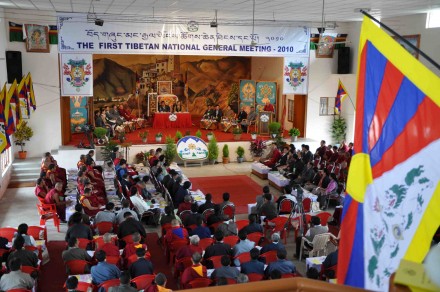The delegates consist of members of the Tibetan Parliament-in-Exile, members of the Kashag, representatives of the four schools of Tibetan Buddhism and Bon, representatives of local Tibetan assemblies, general public, Bod-Rangwang Denpai Legul Tsockchung, NGOs, schools, Tibetan doctors, scholars and social activists.
During the 6-day meeting, the delegates will discuss a wide range of issues such as political affairs, promotion of democracy, religion, culture, sustenance of settlements, education, health, economy, welfare of Tibetans living in scattered communities and resolution of the issue of Tibet through the Middle-Way Approach.
The delegates will be divided into 8 sub-committees to discuss on these issues.
In his opening remarks, Mr Penpa Tsering, Speaker of the Tibetan Parliament-in-Exile, said: “Since the delegates are given choice to join sub-committees in accordance to their nature of their responsibility and interest during this meeting, we hope they will use the best of their skill and intelligence to make the meeting meaningful.”
The Speaker called on the delegates to give suggestions with sound knowledge of the issues concerned.
In his address, Kalon Tripa Samdong Rinpoche said: “The Tibetan community in exile unlike other refugee communities has become one of most exemplary and successful establishment in terms of society, education and health among others.”
“However, the sustenance of the present condition of Tibetans in exile will solely depend on the Tibetan people’s collective merit and their way of thinking and moral behaviour,” he added.
Kalon Tripa said the Tibetan community in exile maintained a good amount of sustainability in terms of livelihood and social stability after gradually tiding over the problems of exile from 1959 until 1970s. But since 1980s and particularly in the last two decades, this positive trend has undergone great changes. These changes needs to be assessed and discussed during this meeting.
He further said if these issues are not tackled properly, the fate of the entire Tibetan people in general and particularly of those in exile will be seriously affected.
Kalon Tripa underlined the need for serious deliberations on strengthening efforts to achieve specialisation in education, population growth, self-reliant community and to check degeneration of ethical behaviour. (Click here to read full statement of the Kashag in Tibetan).
The final recommendation will be presented in the presence of His Holiness the Dalai Lama during the closing ceremony on 31 August.
The opening session began with a minute’s silence as a mark of respect for the people affected by the recent natural calamities in Tibet and other parts of the world.

